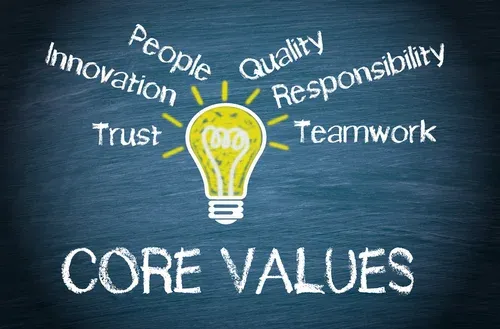Reasonable People Can Disagree—A “Company Values” Hack
Image

There's a lot of talk about "company values" in Startup Land, with good reason. Culture is one of the things that can help make (or break) a young company, but in a rapidly growing business, the point at which founders can no longer shape or control this directly comes quicker than you think.
Values help you plant the seeds for your culture, but how do you keep them from being more than empty words, painted on a wall? One great hack: think about them as something people might actually reject.
Culture Is An Organism—Values Are Its DNA
Here’s the problem: once your culture is fully organic and operating under its own power—which, again, comes much sooner than you might imagine—changing it intentionally can be difficult, even painful. If culture is like a living organism, then values are like its DNA. Getting them right means the organic process will produce benefits rather than defects, which is why everyone talks about them so much.
But settling meaningful values is a challenge. Unlike clear-cut executive tools like org structure, salary bands, reporting formats, or project management systems, values are slippery. They’re subtle and inherently subjective. And like the culture they help spawn, they’re different for every company.
This is why so many “company values” turn out to be more like platitudes, something you absolutely do not want. Case in point: Enron’s “core values” were “Respect, Integrity, Communication, and Excellence”, and look how that turned out.
Reasonable People Can Disagree
Chris Moody, CEO of Gnip (recently acquired by Twitter) once shared a great hack for this problem with me and Zack in the early days of Pantheon: try to express your values in such a way that reasonable people can disagree with them.
It’s counterintuitive, but brilliant. Values help you make decisions. And not obvious decisions like “Should we behave ethically?”, but decisions that otherwise feel murky. Answers to questions like “Should I hire this person” or “When and how do I deliver bad news?”.
Values should help you cut through the noise. To do that, they need an edge.
Try it. Try to think about your values from a (reasonably) disagreeable standpoint. Phrase them in ways that are unappetizing or seem like they have questionable consequences. This isn’t how you’d normally express your values of course, but going through this exercise can help you find their edge and sharpen it.
Who Can Disagree With Trust?
I’ll give you a specific example. One of Pantheon’s company values is trust, a value so obvious it could be accused of being a cliché. Who doesn’t want to work in a trusting atmosphere, to be seen as trustworthy? “Here at Pantheon we value trust.” Duh. Trust is awesome. How could anyone disagree with that?
What if you phrased it like this: “Nobody is going to help you unless you ask.” Suddenly it doesn’t sound quite as rosy. Actually operating in a high-trust environment can be daunting—you’re expected to take on some gnarly problems, handle them with little to no supervision, and deliver results.
Or what if you said, “we expect everyone to prioritize Pantheon’s interest as a company over their personal career goals.” That sounds almost crazy, but a key part of trust is keeping company politics to a minimum, and the genesis of most politics is someone deciding that their personal career goals are more important than the company goals.
For what it’s worth, that usually only happens when the aforementioned “someone” sees the company goals as bogus. Furthermore, that someone might actually be right. Trust falls heavily on management, because maintaining it within an organization depends not only on resisting anti-patterns like micromanagement, but also on having clearly, compellingly communicated goals and vision.
To us, trust means setting the bar high, and being candid about whether you’re clearing it. It’s hard, but it’s supposed to be.
Sharpen Your Values
Hopefully, you can now see how phrasing your values in a disagreeable, or at least debatable, way can help you draw out their specific meaning and also help you candidly assess whether you’re living up to your values or not.
This technique is provocative, and a great way to spark discussion within your team. It’s also great in interviews to draw out a potential new hire and see how she or he responds to something a lot more thorny—but also more engaging—than a set of universal platitudes.
The top-level value words are always going to be general on their face, but if the thinking behind them is sharp, you’re on the right track.


